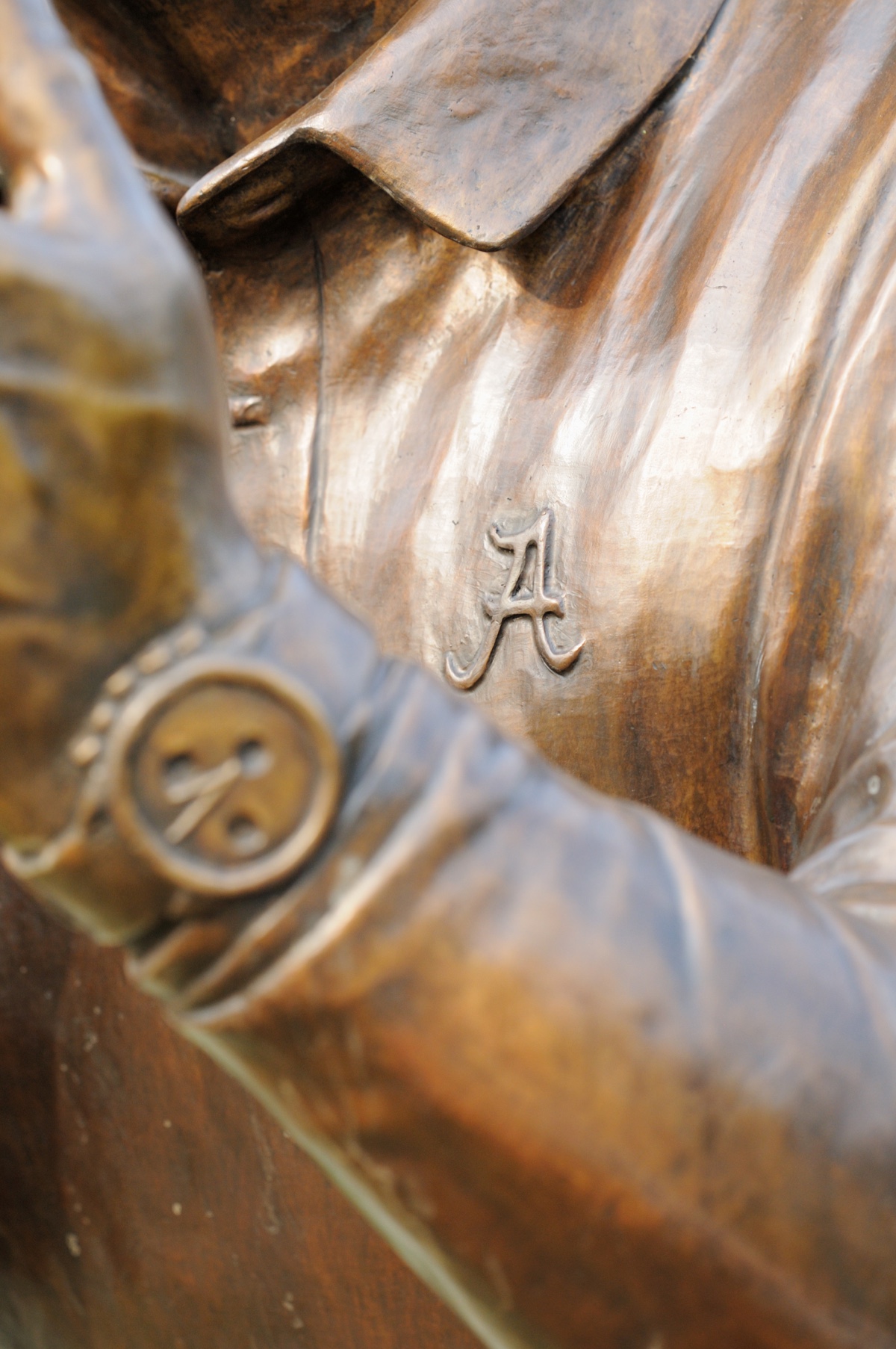by Dennis Abernathy
Synopsis: Paul's frequent use of athletic imagery reminds us of important life-lessons that can be taught through sports. Let\'s consider Nick Saban\'s approach toward coaching and our approach toward living.
Coach Nick Saban is all about what he calls, “The Process.” With seven National Championships (including six at Alabama), Saban has solidified his coaching acumen. For one whose name is synonymous with winning, Saban doesn’t place all the emphasis upon winning. Instead, he tells his assistant coaches and players to focus on “The Process.” He says, “Don’t think about winning the SEC Championship. Don’t think about the national championship. Think about what you need to do in this drill, on this play, in this moment. That’s the process; Let us think about what we can do today, the task at hand.” That is a great perspective! When you consider that in the winner-takes-all fields like sports, results are all that matter: You either win or you lose; there are no moral victories or consolation prizes; if you don’t win, you don’t coach, at least for long! So, what spiritual lessons can we draw from Saban’s example?
A good working definition of “process” is, “The sequence of interdependent and linked procedures which at every stage uses resources until the goal or end result is reached.” That also defines the life of a successful Christian. We must put into practice the resources God has provided for us until we reach our heavenly home.
Life is a time of preparation, a methodical journey, a marathon race! While players and coaches are concerned about being successful at the game of football, we need to be concerned about being successful at the game of life! While commitment to “The Process” has made Alabama a great football team, Christians must manifest similar commitment to God. This steady march actually is a “daily grind.” We must appreciate the journey—with its trials and tribulations, and its successes and failures—–if we hope to reach our heavenly goal.
Consider several relevant quotes from coach Saban: “The belief that the willingness to prepare on a methodical, daily basis is the key to success.” “Many focus on the result, and not the consistent preparation that is necessary to achieve the result, and thus are doomed to disappointment.” Undoubtedly, there are many who want to go to heaven, but they don’t want to make the preparation necessary to get there. Their eyes are not on the goal; they do not walk by faith, but rather by sight (cf. 2 Cor. 5:7). From start to finish, the Christian life is a journey of faith (Rom. 1:16-17). This journey is a process that enables us to grow as we press toward our goal. Along the way, faithful Christians undergo personal and spiritual development. That is where preparation comes in! It does little good to dream of heaven, but not take the steps necessary to achieve that goal. Consider some important lessons:
Like sports, life is inherently complex. Many variables affect our lives, and some are not within our control. In the game of football, there are too many plays, statistics, and countermoves for a player to remember them all. To control them all to perfection would be sheer madness. It is impossible to read and execute every play to perfection over an entire game. Therefore, excellence is a matter of steps, i.e., excelling at the first thing, then the second, and then the next. “The Process” is about staying in the present, and laying siege to the obstacle in front of you. It’s about not getting distracted by all the clutter that will come your way.
Isn’t that a good description of the Christian life? We will never do everything perfectly, nor control everything that goes on around us. Yet, we can live our lives step by step, doing what is right, and seeking to control the present moment, always striving for perfection. This could be defined as a “well-orchestrated life.” If we focus on all the clutter going on around us in the world, which we cannot control, we lose our focus and risk failure. Jesus said, “Don’t worry about tomorrow, tomorrow will take care of itself. Each day has enough trouble of its own” (Matt. 6:34). Therefore, stay focused!
Even while winning a game, often by a big margin, coach Saban can still be seen scowling on the sidelines. If you didn’t know better, you’d think he was coaching the losing team. Why is he upset? As he told ESPN, “I know I get criticized for that. Everybody says, ‘He just won by thirty-one! What’s he complaining about?’ However, it goes back to the inner scoreboard versus the outer scoreboard. Which one is more important? If you’re going to accomplish your goals, it’s always the inner scoreboard.”
It’s the little things that get him fuming. Maybe someone didn’t execute the assigned play, or someone was in the wrong position, or the team didn’t give enough effort. You’d think that such errors would be forgiven if the team wins, but not for coach Saban. His question to his players is always, “How good do you want to be?”
How good of a Christian do you want to be? As Booker T. Washington said, “Success in life is founded upon attention to the small things rather than the large things.” Vincent Van Gogh reportedly said, “Great things are done by a series of small things brought together.” That is true in sports, as individuals, and as a team. It is also true with the Christian and the church. Small things always snowball into big things. That is why Saban always strives to make sure his players do the little things right. Focus on the fundamentals, if you please!
The inspired apostle Paul said, “A little leaven leavens the whole lump” (Gal. 5:9; 1 Cor. 5:6). In other words, a small amount of false doctrine will corrupt the whole of Christianity. What coach Saban is saying is, “When you are winning by a big margin, what outwardly might appear to be unimportant (the little things) has major consequences.” Yes, the outer scoreboard is what most people notice and praise, but it is the inner scoreboard that really reflects what we’ve done right!
It is great to have goals! Yet, in order to reach those goals, we must focus on the specific steps necessary to achieve them, which includes a lot of little things, otherwise we will never get there! We must run by the rules to win the race.
Nick Saban frequently quotes the first line of the book The Road Less Traveled by M. Scott Peck: “Life is difficult!” We know this is true, and not only in sports. Every person faces adversity along the journey of life. While having to overcome adversity isn’t all that pleasant. As coach Saban says, “Achievements in the face of adversity are what make achievements even more worthwhile.”
In 1 Corinthians 9:24, Paul uses an athletic illustration. As successful athletes master their desires and make great sacrifices for the sake of winning, so also must the Christian. Athletics were popular in the first-century Greco-Roman world. They held regular competitions. Spectators and fans were enthusiastic. Champion athletes toured cities and towns, receiving accolades. Monuments were erected in their honor. Victors’ names became familiar in every household. In antiquity, young men sought athletic glory, just as many now dream of playing college and professional football, or some other sport. Purpose, discipline, and determination must characterize a successful and great athlete. There is no easy way to success; it is always the product of toil and work. Nothing of consequence is ever achieved without discipline. Championship football players do not become such without sweat!
The Christian’s life is beset with difficulties. Jesus said, “Narrow is the gate and difficult is the way which leads to life, and there are few who find it” (Matt. 7:14). In His discussion of the parable of the closed door, Jesus said, “Strive to enter through the narrow door; for many, I tell you, will seek to enter and will not be able” (Luke 13:24). The Greek term for “strive” is the source of the English words “agonize” and “anguish.” The road Christians travel is filled with adversity, difficulties, struggles, and even persecutions. Obviously, much effort is required to enter heaven.
Therefore, the need for mental toughness and discipline is paramount. As we run the race of life, we must block out all the clutter of the world and focus on the work at hand. Such is not always an appealing and comfortable decision. Life is made up of choices and decisions. I will quote coach Saban again from a speech where he remarked, “Most people have something every day that they don’t want to do, but they know they should, so they do it (or the opposite). Likewise, most people have something every day that they know they should not do, and they choose not to (or the opposite). It’s these daily choices that are influenced by our discipline and mental toughness, in terms of having the strength to make the right ones.”
Alabama football players who are not willing to set their eyes on the goal and do whatever is necessary to do their job in order to achieve that goal rarely hang around for very long. The same is true for the Christian. Are you willing to give your all to the Lord (Matt. 6:33; Rom. 12:1-2; Col. 3:1-2)? We have a goal. Let us work to achieve it.
In sports, the process gives players something they need to do. This involves paying attention to details, being in the right place at the right time, playing your position, etc. It keeps players from becoming complacent. It is geared to long-term thinking. Football is about the individual player, but it is also a team sport. Both must adhere to the process. As Bill Belichick (Saban’s former mentor) said, “Do your job!” In football, it is always about putting forth the effort, fixing things that hinder, and moving forward. The same is true for the Christian as we journey toward heaven.
The apostle Paul said, “One thing I do, forgetting those things that are behind and reaching forward to those things which are ahead. I press toward the goal for the prize of the upward call of God in Christ Jesus” (Phil. 3:13-14). A Christian views growth as a lifelong process, so he has a long-haul attitude and mindset, and never has the attitude that says, “I’ve arrived.” Instead, he keeps moving ahead! In moving ahead, he trusts in God’s process-obeying His commands—fixing and correcting the things that need to be fixed—exercising the discipline necessary, as he presses on toward maturity and the end of the race.
Paul had been converted some twenty years before he wrote these lines to the Philippians, and yet he did not say that he had arrived. He continued to “press on.” Although he had been at it for some twenty-five years, the aged apostle didn’t view himself as having attained the goal. So he pressed on, as a runner stretches toward the finish line!
Paul said he was “forgetting those things that are behind.” Again, the picture is of a runner who does not make the mistake of looking over his shoulder—his eyes are fixed on the finish line! The past must not control us. In football, if you lose a game, you move on. Alabama won three national championships, and in all three seasons they lost a game—but they moved ahead! They didn’t look back and dwell on the loss!
Think of a car’s rear-view mirror. You don’t drive by looking in the mirror. You drive by looking ahead out of the windshield. While it is helpful to take occasional glances in your mirror and use the information to decide how to drive safely in the present and the future, if you spend too much time looking in your mirror, you’ll probably crash because you’re not paying attention to the present. Just so, all of those national championships in the past do not earn any in the present and in the future unless they continue to move on. Paul wrote, “Let us not grow weary in well-doing, for in due season we shall reap, if we do not lose heart” (Gal. 6:9). Get the point?
I think it is interesting that Nick Saban’s success as a head coach really comes down to a life philosophy. When most people think of “The Process,” as it relates to coach Nick Saban, they picture him on the practice field, voice raised, coaching hard, with an intensity in his eyes. When you actually think about what “The Process” is, you find it goes well beyond football. It’s actually a philosophy rooted in sound psychological advice. Regardless of our profession or situation, this approach can be life-changing if adhered to properly.
“Process: Terms Relating to Process and Products.” APB Consultant. http://isoconsultantpune.com/iso-90012008-quality-management-system/iso-90002005/terms-relating-to-process-and-products-in-qms/.


